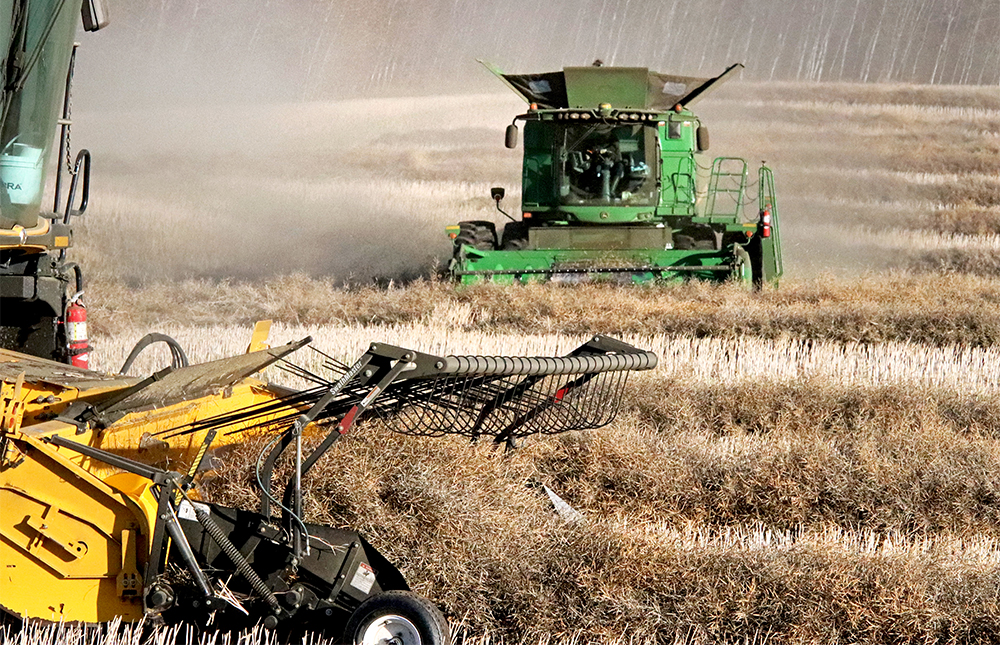Prime Minister Justin Trudeau is under fire for the deteriorating Canada-China relationship, but his misstep may have been to be too accommodating to the Asian superpower.
The Canada-U.S. relationship hit a low when President Donald Trump imposed U.S. tariffs on Canadian steel due to “national security concerns,” forced Canada into impromptu and brutal negotiations for a new North American Free Trade Agreement and threatened to abandoned NATO, which the Canadian government maintains as a pillar of its national security.
The U.S. doesn’t seem to want to play nice with Canada, but that doesn’t mean it didn’t get a little bit jealous over Canada’s increasingly cozy relationship with China — prior to Huawei executive Meng Wanzhou’s detention by Canadian officials last December.
Read Also

Proactive approach best bet with looming catastrophes
The Pan-Canadian Action Plan on African swine fever has been developed to avoid the worst case scenario — a total loss ofmarket access.
Briefing notes given to federal Finance Minister, Bill Morneau for his November 2018 trip to China show Canada working enthusiastically to deepen the relationship between the two countries — which included expanding trade and commercial co-operation and increasing co-operation on human rights and peace and security issues.
“To this end, Canada and China hold regular high-level exchanges, including annual dialogues between leaders, foreign ministers and several other ministers,” the note said.
Beyond working toward strengthening ties between the two countries, Canada has also offered to play a broker role for China to help it transition into becoming a member of international economic institutions.
The note states that during Morneau’s July G20 meeting in Buenos Aires, Chinese Finance Minister Liu Kun highlighted China’s interest to “further deepen the strategic partnership between our two countries,” the note stated.
“In particular, Minister Liu noted the importance for Canada and China to join forces to combat protectionism and promote an open global trading system.”
It’s hard to imagine the protectionism remark referring to any other country than the United States.
In September, the note said, Canada and China discussed WTO reforms at the United Nations’ General Assembly, where Foreign Affairs Minster Chrystia Freeland met with State Councillor and Foreign Minister Wang YI.
“China expressed a positive view of the Canadian approach because of its neutral character and has indicated a willingness to maintain close communication with Canada on the issue,” the note states.
One of Canada’s goals for the November meeting in China was to promote China’s increased engagement in multilateral economic frameworks, including the Paris Club.
“If China agrees, Canada could play a broker role to help China pursue Paris Club membership, consistent with Hangzhou G20 Communiqué,” the note stated.
The Paris Club consists of officials from major creditor countries, whose role is to find co-coordinated and sustainable solutions to the payment difficulties experienced by debtor countries.
China has recently become a major creditor for developing countries, but some of them are facing challenges repaying the loans.
When it came to bilateral discussions, China requested framing discussions around two sectors where they see the potential for greater bilateral engagement — agriculture and energy.
Canada was also keen on discussing how to “position Canadian financial institutions as key partners in China’s fast-growing financial service markets, particularly in the areas of pensions,” the note said.
The note shows Morneau met with Lou Jiwei, chair of the National Council of the Social Security Fund (NCSSF), which has more than US$300 billion worth of assets under management, but only 10 percent is invested overseas.
However, China has indicated that it wishes to increase the foreign share of these assets in order to increase returns, and Canada would be a happy recipient of some of these investments.
Morneau was to explain the Canada Pension Plan to Jiwei to show that it is fully funded and sustainable, and to offer Canadian help in modernizing China’s pension plan.
On the energy side, the China National Offshore Oil Corporation (CNOOC) has aggressively acquired energy companies and resource rights around the globe, and Canada is no exception.
In this country, CNOOC bought Nexen for more that $15 billion in 2012.
Nexen’s Canadian assets include the Long Lake oilsands facility and has partial interests in the Hangingstone, Syncrude and Christina Lake oilsands projects in Alberta.
CNOOC also has major interests in Canada’s liquid natural gas sector and has been kicking the tires on building a major LNG production project in northern British Columbia to help secure supply for the 10 import facilities the company operates in China.
For Morneau’s meeting with Yang Hua, chair and secretary of CNOOC’s Party Leadership Group, the briefing note suggests Canada is floating the idea of selling the Northern Gateway to CNOOC.
“At the appropriate time, Canada will work to transfer the Trans Mountain entities to a new owner or owners in a way that protects the public interest,” the note said in the talking point section.
“We are interested to hear your initial thinking in terms of whether an eventual investment might make sense.”
It’s unlikely the U.S. would look favourably on a Chinese state-owned company gaining a conduit directly to Canadian crude, especially since the pipeline was firmly in the hands of a U.S. company less than a year ago.
Canada’s heavy crude, Western Canadian Select (WCS), usually trades at a $10 to $15 per barrel discount compared to West Texas Intermediate (WTI) because of refining and transportation costs.
However, the biggest gap to date between the two types of oil was recorded last October at $52 per barrel.
China remains heavily invested in Canadian energy, but it’s unlikely there would now be public support in Canada to sell a major Canadian asset to CNOOC in the near future because of China’s over reaction to Meng’s detention.
There is no direct evidence to support conspiracy theories circulating online that the U.S. set Canada up by asking Canadian authorities to detain Meng in Vancouver in early December.
Can we really imagine the U.S. would go to such an elaborate exercise to control a foreign oil reserve, or that Trump would throw his friendly neighbour to the north under the bus in such a way?
It’s likely a happy coincidence for U.S. soybean farmers, who are now covering the oilseed shortfall in China since the door was slammed on Canadian canola producers.
It is unfortunate, though, that in less than a month the relationship between Canada and China went from “arm in arm to the dance” to rapidly deteriorating with no sign its going to get better any time soon.
robin.booker@producer.com


















